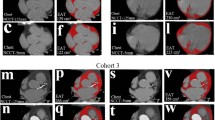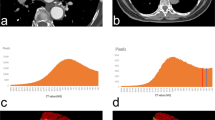Abstract
We evaluated the feasibility of using quantitatively measured thoracic components, as compared to body mass index (BMI), for predicting the image noise of coronary computed tomography angiography (CCTA). One hundred subjects (M:F = 64:36; mean age, 55 ± 8.8 years) who underwent prospective electrocardiography-gated CCTA and low-dose chest computed tomography (CT) were analyzed retrospectively. The image noise of the CCTA was determined by the standard deviation of the attenuation value in a region of interest on the aortic root level. On the low-dose chest CT, the areas of the thoracic components were measured at the aortic root level. An auto-segmentation technique with the following threshold levels was used: quantitatively measured area of total thorax [QMAtotal: −910 to 1000 Hounsfield units (HU)], lung (QMAlung: −910 to −200 HU), fat (QMAfat: −200 to 0 HU), muscle (QMAmuscle: 0–300 HU), soft tissue (fat + muscle, QMAsoft tissue: −200 to 300 HU), bone (QMAbone: 300–1000 HU) and solid tissue (fat + muscle + bone, QMAsolid tissue: −200 to 1000 HU). The relationship between image noise and variable biometric parameters including QMA was analyzed, and the linear correlation coefficients were used as indicators of the strength of association. Among the variable biometric parameters, including BMI, QMAsolid tissue showed the highest correlation coefficient with image noise in all subjects (r = 0.804), males (r = 0.716), females (r = 0.889), the overweight (r = 0.556), and the non-overweight subgroups (r = 0.783). QMAsolid tissue can be used as a potential surrogate predictor of the image noise level in low tube voltage CCTA.





Similar content being viewed by others
References
Yoshimura N, Sabir A, Kubo T, Lin PJ, Clouse ME, Hatabu H (2006) Correlation between image noise and body weight in coronary CTA with 16-row MDCT. Acad Radiol 13(3):324–328
Herzog BA, Husmann L, Valenta I, Tay FM, Burkhard N, Gaemperli O, Wyss CA, Landmesser U, Kaufmann PA (2009) Determinants of vessel contrast in BMI-adapted low dose CT coronary angiography with prospective ECG-triggering. Int J Cardiovasc Imaging 25(6):625–630
Leschka S, Stolzmann P, Schmid FT, Scheffel H, Stinn B, Marincek B, Alkadhi H, Wildermuth S (2008) Low kilovoltage cardiac dual-source CT: attenuation, noise, and radiation dose. Eur Radiol 18(9):1809–1817
Neefjes LA, Rossi A, Genders TS, Nieman K, Papadopoulou SL, Dharampal AS, Schultz CJ, Weustink AC, Dijkshoorn ML, Ten Kate GJ, Dedic A, van Straten M, Cademartiri F, Hunink MG, Krestin GP, de Feyter PJ, Mollet NR (2013) Diagnostic accuracy of 128-slice dual-source CT coronary angiography: a randomized comparison of different acquisition protocols. Eur Radiol 23(3):614–622
Meijboom WB, Meijs MF, Schuijf JD, Cramer MJ, Mollet NR, van Mieghem CA, Nieman K, van Werkhoven JM, Pundziute G, Weustink AC, de Vos AM, Pugliese F, Rensing B, Jukema JW, Bax JJ, Prokop M, Doevendans PA, Hunink MG, Krestin GP, de Feyter PJ (2008) Diagnostic accuracy of 64-slice computed tomography coronary angiography: a prospective, multicenter, multivendor study. J Am Coll Cardiol 52(25):2135–2144
Paul NS, Kashani H, Odedra D, Ursani A, Ray C, Rogalla P (2011) The influence of chest wall tissue composition in determining image noise during cardiac CT. AJR Am J Roentgenol 197(6):1328–1334
Menke J (2005) Comparison of different body size parameters for individual dose adaptation in body CT of adults. Radiology 236(2):565–571
Brenner D, Elliston C, Hall E, Berdon W (2001) Estimated risks of radiation-induced fatal cancer from pediatric CT. AJR Am J Roentgenol 176(2):289–296
Huda W, Scalzetti EM, Levin G (2000) Technique factors and image quality as functions of patient weight at abdominal CT. Radiology 217(2):430–435
Renker M, Ramachandra A, Schoepf UJ, Raupach R, Apfaltrer P, Rowe GW, Vogt S, Flohr TG, Kerl JM, Bauer RW, Fink C, Henzler T (2011) Iterative image reconstruction techniques: applications for cardiac CT. J Cardiovasc Comput Tomogr 5(4):225–230
Haaga JR (2001) Radiation dose management: weighing risk versus benefit. AJR Am J Roentgenol 177(2):289–291
Wildberger JE, Mahnken AH, Schmitz-Rode T, Flohr T, Stargardt A, Haage P, Schaller S, Gunther RW (2001) Individually adapted examination protocols for reduction of radiation exposure in chest CT. Invest Radiol 36(10):604–611
Ghoshhajra BB, Engel LC, Major GP, Verdini D, Sidhu M, Karolyi M, Abbara S, Hoffmann U, Kalra M, Brady TJ (2011) Direct chest area measurement: a potential anthropometric replacement for BMI to inform cardiac CT dose parameters? J Cardiovasc Comput Tomogr 5(4):240–246
Mahnken AH, Wildberger JE, Simon J, Koos R, Flohr TG, Schaller S, Gunther RW (2003) Detection of coronary calcifications: feasibility of dose reduction with a body weight-adapted examination protocol. AJR Am J Roentgenol 181(2):533–538
Kalra MK, Maher MM, Prasad SR, Hayat MS, Blake MA, Varghese J, Halpern EF, Saini S (2003) Correlation of patient weight and cross-sectional dimensions with subjective image quality at standard dose abdominal CT. Korean J Radiol 4(4):234–238
Schuhbaeck A, Schaefer M, Marwan M, Gauss S, Muschiol G, Lell M, Pflederer T, Ropers D, Rixe J, Hamm C, Daniel WG, Achenbach S (2013) Patient-specific predictors of image noise in coronary CT angiography. J Cardiovasc Comput Tomogr 7(1):39–45
Abbara S, Arbab-Zadeh A, Callister TQ, Desai MY, Mamuya W, Thomson L, Weigold WG (2009) SCCT guidelines for performance of coronary computed tomographic angiography: a report of the Society of Cardiovascular Computed Tomography Guidelines Committee. J Cardiovasc Comput Tomogr 3(3):190–204
Hausleiter J, Meyer T, Hermann F, Hadamitzky M, Krebs M, Gerber TC, McCollough C, Martinoff S, Kastrati A, Schomig A, Achenbach S (2009) Estimated radiation dose associated with cardiac CT angiography. JAMA 301(5):500–507
Fuchs TA, Stehli J, Bull S, Dougoud S, Clerc OF, Herzog BA, Buechel RR, Gaemperli O, Kaufmann PA (2014) Coronary computed tomography angiography with model-based iterative reconstruction using a radiation exposure similar to chest X-ray examination. Eur Heart J 35(17):1131–1136
Oda S, Utsunomiya D, Funama Y, Katahira K, Honda K, Tokuyasu S, Vembar M, Yuki H, Noda K, Oshima S, Yamashita Y (2014) A knowledge-based iterative model reconstruction algorithm: can super-low-dose cardiac CT be applicable in clinical settings? Acad Radiol 21(1):104–110
Expert Consultation WHO (2004) Appropriate body-mass index for Asian populations and its implications for policy and intervention strategies. Lancet 363(9403):157–163
Sevrukov A, Pratap A, Doss C, Jelnin V, Hoff JA, Kondos GT (2002) Electron beam tomography imaging of coronary calcium: the effect of body mass index on radiologic noise. J Comput Assist Tomogr 26(4):592–597
Vollmar SV, Kalender WA (2009) Reduction of dose to the female breast as a result of spectral optimisation for high-contrast thoracic CT imaging: a phantom study. Br J Radiol 82(983):920–929
Author information
Authors and Affiliations
Corresponding author
Ethics declarations
Conflict of interest
None.
Rights and permissions
About this article
Cite this article
Kim, H., Park, C.H., Han, K.H. et al. Predicting the image noise level of prospective ECG-triggered coronary computed tomography angiography: quantitative measurement of thoracic component versus body mass index. Int J Cardiovasc Imaging 31 (Suppl 2), 213–221 (2015). https://doi.org/10.1007/s10554-015-0796-6
Received:
Accepted:
Published:
Issue Date:
DOI: https://doi.org/10.1007/s10554-015-0796-6




